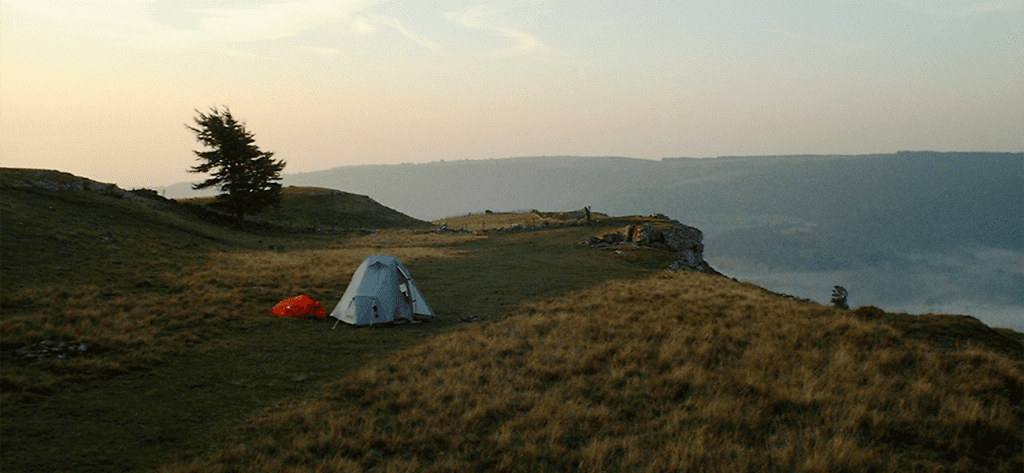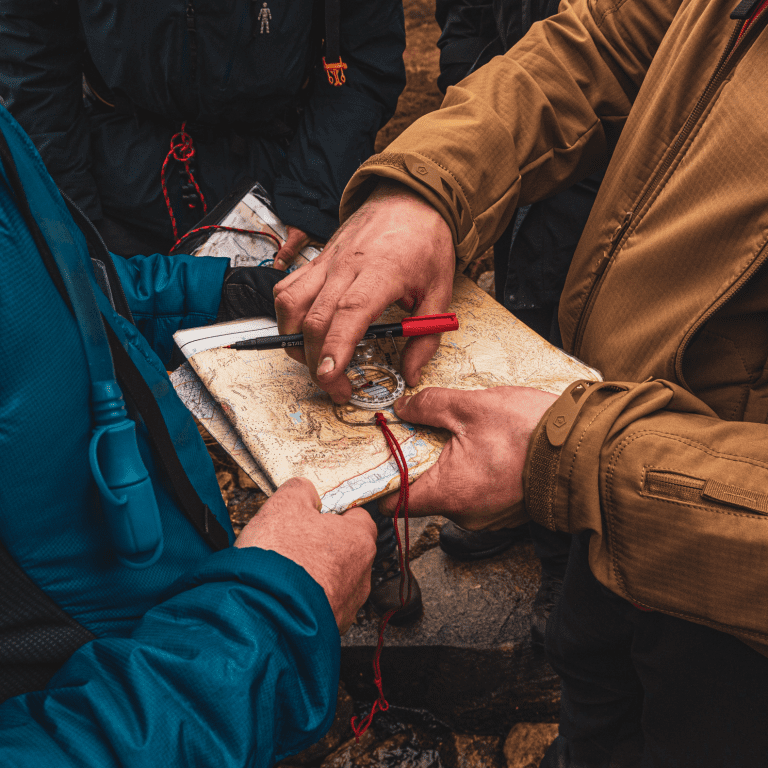
UK Wild Camping Laws Explained
22nd November 2018
The laws and rules about where you ‘can’ and where you ‘cannot’ camp in the hills, mountains, forests and countryside of the United Kingdom always provokes a little debate when discussed. It’s something we talk about on our wild camping course and other campcraft courses, and if you have been following our blog for the last few years you might remember this post where I argued AGAINST the signing of a petition that wanted to legalise wild camping in England and Wales. In that post I wanted to point out that although wild camping is legally difficult, it is possible.
This post explains the laws and rules around wild camping in England, Scotland, Wales and Northern Ireland as to the best of my understanding as an outdoor professional. I’ve also tried to include some other legal issues that may be worth considering when heading out to camp in the mountains and forests.
Can I Wild Camp in the U.K?
Good question. I suppose it depends on what you mean by ‘can’.
If you mean ‘is it physically possible to find somewhere to camp?‘ then of course the answer is ‘yes’. I wild camp somewhere in the UK about once per month and have a decent success rate. I have been camping in the mountains and forests and on the coastline of the UK since I was about 18 – a time that seems to be getting further away at an alarming rate!
If however you mean ‘am I legally entitled to wild camp where I want to in the U.K?‘ then the answer is probably going to involve a sucking of teeth and a ‘well, it depends…’
The problem is that for most of the U.K. we do not have a ‘wild camping law’. The legal rules pertaining to camping on somebody else’s land aren’t clear and are bound up in historic assertions of property and personal rights dating back centuries. Current legislation for most of the U.K. focuses more on the actions of travellers, gypsies and other migratory groups that may park on land with vehicles and caravans – as you can see in this PDF.
The Criminal Justice and Public Order Act 1994 (CJPOA, particularly sections 61-80) conveyed powers onto the Police and created offences relating to various forms of trespass – but again the focus is away from the hiking and camping community and more towards other groups – the examples often cited are ‘hunt saboteurs’ or those participating in a free parties or raves. Quoting the CJPOA in the case of ‘true’ wild camping in the mountains doesn’t really help though, as in the vast majority of cases the trespass on the land would be a civil matter rather than a criminal one.
But that’s about as clear as a mud smoothie, so let’s look at the individual cases for England, Wales, Scotland and Northern Ireland.
Wild Camping Laws for England and Wales
Almost all of the land you can walk across in England and Wales is owned by somebody. It may be an individual, a company/commercial organisation (including The Crown Estate), a charity (National Trust etc) or even the government or similar authority. These are almost always referred to as the ‘landowner’ and I will do the same throughout this post.
In England and Wales you do not have the right to pitch a tent, tarp, hammock or bivvy bag on the land belonging to somebody else without the permission of that landowner. To do so without the permission of that landowner means that you are committing trespass – which is a civil offence (i.e. non-arrestable). However, if you do not immediately leave when directed to do so by the landowner or somebody acting on their behalf (such as a gamekeeper or land agent, or security guard) then you may be committing a criminal offence (Aggravated Trespass) – something that a Police officer can arrest you for. There are also a few places where you will be immediately committing criminal trespass as soon as you cross onto that land – such as railway lines, some education establishments and of course sites vital for national defence and security.
This all still applies if you are in the middle of nowhere, stood on top of a mountain in Snowdonia or the Lake District, and cannot see another human or even a road. In the vast majority of cases it still belongs to a landowner, and legally speaking you would still need the permission of the landowner.
The Countryside Rights of Way Act (CROW Act 2000)
This was a landmark piece of legislation that opened up huge swathes of the English and Welsh countryside to the general public, creating what is often referred to as the Right to Roam. This means that within certain, designated areas (often upland and large areas of forest or heathland) the general public can walk over the land, away from Public Rights of Way. This opens up most of the mountainous and remote areas of England and Wales for recreation and exploration on foot and effectively ended disputed access over certain areas, such as Chrome Hill in the Peak District.
One thing that wasn’t included in the Right to Roam was the ‘Right to Camp’ – it did not change the fact that camping on land without permission of the landowner is civil trespass, and in fact says quite clearly that camping is not permitted under the CROW Act:
1. Section 2(1) does not entitle a person to be on any land if, in or on that
land, he:
…
(s) engages in any organised games, or in camping, hang-gliding or paragliding,
That’s pretty clear – the CROW Act changed a lot about where we could walk, but not about where we were legally allowed to camp.
Hang on, what about Dartmoor?
Right Dartmoor. That is a different case.
16th Century English poet John Leland said that “Dartmore is muche a wilde Morish and forest Ground“. He wasn’t wrong, although there is a bit less forest now than there was in his day.
This fairly wild and expanse tract of moor in the South West of England abounds with myths and literary associations (watch out for The Hound of the Baskervilles), and is also home to various Ministry of Defence (MOD) training sites and a few other places of interest. It’s also pretty much the only place where you can legally wild camp in England without first checking with the landowner.
There are local byelaws that permit camping within certain areas of the Dartmoor National Park (see interactive map below) as long as you do so within the following rules:
No person shall knowingly use any vehicle, including a caravan or any structure other than a tent for the purpose of camping on the access land or land set out for the use or parking of vehicles except on any area which may be set apart and indicated by notice as a place where such camping is permitted.
No person shall knowingly erect a tent on the access land for the purpose of camping:(a) in any area listed in Schedule 2 to these byelaws;(b)within 100 metres of any public road or in any enclosure.
No person shall camp in a tent on the same site on the access land for more than two consecutive nights, except on any area which may be set apart and indicated by notice as a place where such camping is permitted.
Wild Camping Laws for Scotland
In Scotland the situation is a lot simpler. The Land Reform Act (Scotland) was enacted by the Scottish Parliament in 2003 and took the idea of the CROW Act and developed it even further. It created, amongst other things, a legal framework for land access in Scotland and included the development of the Scottish Outdoor Access Code.
One of the guiding principles of the Land Reform Act was that everyone has the right of access to the land and inland water of Scotland for recreation so long as they do so responsibly and without impinging on the the rights and freedoms of others. The ways in which responsible access can be exercised is laid out in the Scottish Outdoor Access Code, and quite clearly says that wild camping is permitted under the Scottish Outdoor Access Code and that as long as you:
- are not camping in enclosed areas (i.e. fields with crops or animals) or close to buildings and historic monuments
- are camping away from roads
- leave no trace (including good guidance on campfires)
There are some byelaw restrictions on camping in certain areas, most notably and controversially the restrictions on camping around parts of the Loch Lomond and Trossachs National Park.
Wild Camping Laws for Northern Ireland
In some cases you find that the laws for Northern Ireland are slightly different from those of England, Scotland and Wales for one reason or another. However, in the case of Northern Ireland wild camping rules it is pretty much the same situation that existed in England and Wales prior to the introduction of the CROW Act in England and Wales:
- There are Public Rights of Way but no ‘Right to Roam’ as such
- There is no right to ‘wild camp’, and to do so without the permission of the landowner would be considered trespass, as it is in England and Wales (mostly)
Wild Camping and Campfires
The association between a roaring (or even quietly burning) campfire is about as strong as you can get, but the issue of lighting fires on somebody else’s land is as complex as that of trespass and wild camping.
England, Wales and Northern Ireland
Here you would need the permission of the landowner to light a fire and you do not have the right to do so. This also includes Dartmoor, where wild camping is legal in certain areas (see map and description above).
Anybody lighting a fire on somebody else’s property without their permission needs to consider how it can be construed in a legal sense – trespass is a civil offence and you simply being there without permission and leaving immediately once asked to do so is a civil, not criminal matter. However – would lighting a fire (and presumably, gathering firewood from the immediate area and burning it) be considered criminal damage? There are so many variables to consider that it is impossible to give a clear answer – but it is wrong to assume that you ‘have the right’ to light a fire, just because you saw somebody on YouTube do it… For further reading take a look at the Criminal Damage Act 1971.
Scotland
As outlined above, camp fires are technically permitted under the Land Reform Act, but all (legal) access to land under the Land Reform Act needs to be done whilst adhering to the Scottish Outdoor Access Code. There is a strong recommendation that you use a stove, not an open fire, to cook over – and with good reason.
Wild Camping with a Knife or an Axe
This is an often overlooked problem, but in the bushcraft, survival and forest wild camping world you will find an endless range of photos and videos of people using axes and other cutting tools to fell trees, make shelters, process firewood and so on. It’s natural for somebody to assume that if they are wild camping then they can bring along a camping tool such as a knife, or a hatchet – right?
Welllllllll……
Consider this – in England, Wales and Northern Ireland you will need the permission of landowner to camp on their land. If you camp and do not have that permission then you are trespassing – a civil offence in most cases. But what if you have a very sharp, well-maintained and lovingly sharpened Gransfors Bruks hatchet or axe strapped to the side of your pack? Or a fixed-blade knife (or locking blade, or folding blade of longer than 3″ etc etc)? Is it still JUST trespass, or is it now armed trespass? Or possession of a bladed article without lawful reason to do so? In UK law the onus is generally on the person carrying the axe/fixed-blade/locking blade knife to justify WHY they are carrying in that place, at that time. If you do not have a lawful excuse for being in that forest (i.e. you are illegally wild camping without landowner permission), then does your reason for carrying a ‘camping tool’ no longer stand?
Again, there are many variables to consider here and I have no clear answers. The Police officers I work with as clients, the ones I have as friends and others working in the legal professions in the UK I have asked about it all have slightly different interpretations of what “they would do in that situation”.
It’s down to the individual to make their own decisions about how they carry a knife or axe when wild camping in the U.K.- and if they actually NEED to do so.
Wild Camping in the U.K. – my own experiences
I have wild camped in countless locations around the British Isles. I have yet (fingers crossed) come across a landowner or been asked to leave. There is a generally-accepted tolerance to wild camping in the more mountainous areas of England and Wales – if you arrive late, leave early and camp above the highest fenceline or wall then you are unlikely to come into conflict with a landowner or their representatives.
I try to be careful with where I select a spot to pitch a tent or lay my bivvy bag if wild camping in England and Wales – I go for spots that are set back from the edge of a slope where possible, and far away from roads and houses. I also try and move away from busy footpaths or popular areas – the middle of Cwm Idwal or next to Glaslyn on Snowdon might seem like a perfect place for an ‘epic’ mountain camp but you’re going to cause visual pollution for the tens, if not hundreds, of people who are going to spot you if you are a little bit late in striking camp.
There is also the issue of your ‘impact’ – what trace are you leaving by camping there? Ideally it will be a small patch of temporarily flattened grass and some easily-missed tent peg holes. But what about your toilet arrangements? The excess noodles that welded themselves to the bottom of the pan? The scrap of plastic that escaped from the tent when you unzipped the flap in the morning?
Worrying about being ‘caught’ by a landowner is just a small part of wild camping in the mountains of England, Wales and Northern Ireland – your environmental and ecological impact needs to be considered just as much – if not more.
Did you really need to fell that dead-standing birch and have a fire for 6 hours? Would a gas or meths stove have boiled your water just as well?
A Wild Camping Code of Practice
The below is a code of practice I try to adhere to when wild camping ANYWHERE in the U.K.:
- Arrive late and leave early, and move on every day
- Avoid visual disturbance where possible – don’t be the big, orange shining beacon visible for miles around
- Be considerate of others – be them landowners, fellow campers or other people who seek solace in the wild places of the UK
- Leave No Trace other than footprints wherever possible, and go to great lengths to hide any trace you might have to leave
- You are going to need to poo at some point – do it at least 50m away from paths, water sources and other common features. Further if possible (other rules apply for other countries)
- If you carried it in, you carry it out. Banana skins, orange peel, tissues. The lot.
- Use a stove where possible. Campfires use resources and leave a lot of residual evidence if not managed correctly.
A Mountain Leader with over a decade of experience across the UK and overseas, Richard is our Lead Instructor and a partner in Original Outdoors. He is a specialist in temperate wilderness skills and the wild foods of the British Isles, and also works as a consultant for various brands and organisations. Richard lives in North Wales.
A Life more Wild.
A Life More Wild is the philosophy which underpins everything we do.
It encompasses practical skills, personal development, community learning and a journey to live more intentionally.





